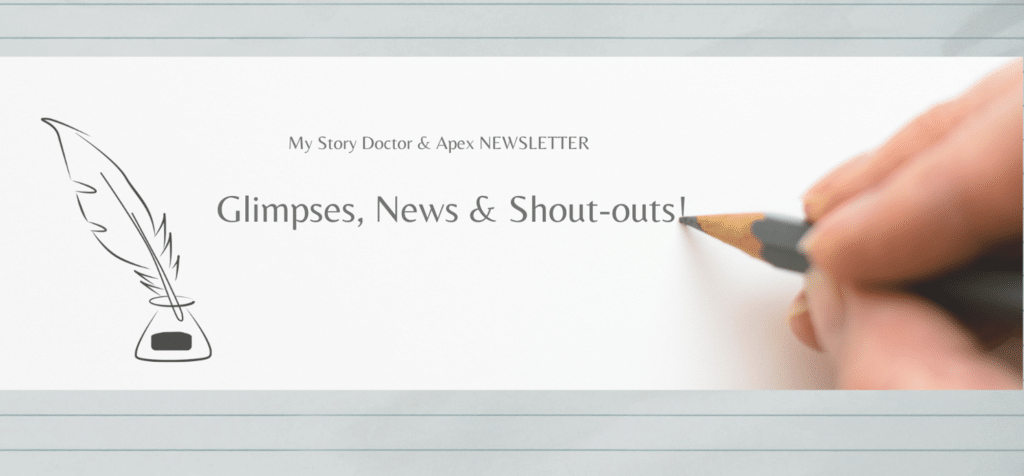Dialog tags help the reader know who is speaking the dialog.
Recently, I shared how you could write bad dialog in your stories. The truth is, though, if you really want to write wretched dialog, you should consider working on your dialog tags. Here are a few options that you might not have considered.
I love a story that starts out with tags like this:
Elena: “Did you buy the soup?”
Jacob: “What soup?”
Elena: “The split pea soup that I begged you to pick up from the store. . . .”
And on it goes. Now, I think that sometimes writers who are new to writing dialog do this by accident. They don’t really know how to punctuate dialog, so they put the tags all on the very front, or the very end. If you load the tags on the front, then your characters become nothing more than talking heads. They can be seen as existing outside of space and time, with no facial features or movements. But it’s not always an accident. I’ve seen accomplished writes get lazy and write talking-head dialog—even some very good writers.

Then of course, there is the “describe your character through character tags” dialog. For example:
The wizard peered into the crystal ball. “Finally,” the king muttered, “the dark ships have set sail!” The old man strode across the room and looked out the window of the tower. . . .
So when you read this, you have to wonder, how many people are in this room? I once read a long passage like this and after two pages asked the author that question. I told her, “I think there may be as many as thirteen people in this room, but possibly as few as three.” Her answer astonished me. “There’s only one.” The king, the wizard, the general, the old man, the loving father, Jaspar, the Thief of Aldor—all were one person. If you want to reduce your dialog to pure dreck, try giving us dozens of character tags for one person.
One of my favorite forms of wretched dialog is the late attribution. For example, you have several people in a room, and suddenly you have someone begin a page-long diatribe. It’s always fun to surprise the reader by putting the speaker’s name at the end, so that whomever the reader thought was talking, isn’t. Then the reader gets to stop and think about it and re-cast the story from an unexpected speaker’s voice.

This works especially well if the speaker comes as a surprise. For example, let’s say that you have Lana and Kyle sitting at a restaurant engaging in conversation for six pages. Then, a speaker butts in and after a long paragraph, we find out that it was Lana’s ex-husband, Ray, who was speaking. What a surprise! The reader is left to wonder, so was Ray sitting there the whole time? And why in the world would he be there? Why didn’t the author tell me?
But there is one more type of attribution that really takes the cake: I’ll call it the non-attribution. Here’s a sample of it:
“I still care about you, and always will.” The words were spoken lovingly, longingly, as the stiletto was driven into his heart.
In this particular case, we don’t know who is speaking, whether it is male or female. And we don’t know what’s going on at all, really. Apparently, greater minds than mine have discovered that if you leave out a lot of information at the opening of a story—such as the identities of the speakers—it apparently excites the reader into a frenzy as they try to figure out the mystery of who is speaking, and who is doing what to whom and why.
There are a thousand ways to write wretched dialog, but if you want to take it to new heights, try tagging your excremental dialog in novel new ways!
Previously Published
***

📌 Remember to Mark Your Calendar!
Renowned Hollywood script consultant and story expert, Michael Hauge will be presenting HOW TO SEDUCE YOUR READER IN THE FIRST 10 PAGES on Monday, Feb. 27, 2023 at 7 pm MT/ 9pm ET
- The opening of your screenplay or novel is your single most powerful weapon for acquiring an agent or securing a deal. Using examples from recent successful films and novels, Michael reveals the secrets of transforming your opening scenes into emotionally gripping sequences that will force readers to turn the page.

MICHAEL HAUGE is a script consultant, story expert, author and lecturer who works with writers, filmmakers, marketers, business leaders, attorneys and public speakers, both in Hollywood and around the world. He has consulted on projects starring Morgan Freeman, Julia Roberts, Tom Cruise and Reese Witherspoon, and for Overbrook Entertainment, where he consulted on the scripts for (among many others) I AM LEGEND, HANCOCK, THE KARATE KID, SUICIDE SQUAD and BRIGHT, which is currently in production.
Michael is the best selling author of Selling Your Story in 60 Seconds: The Guaranteed Way to Get Your Screenplay or Novel Read, as well as the 20th Anniversary Edition of his classic book Writing Screenplays That Sell. His latest book, Storytelling Made Easy: Persuade and Transform Your Audiences, Buyers and Clients ! Simply, Quickly and Profitably became an Amazon best seller within 3 days of its release. And he has presented seminars, lectures and keynotes in person and online to more than 500,000 participants worldwide. According to Will Smith, “No one is better than Michael Hauge at finding what is most authentic in every moment of a story.
For information on Michael coaching and consulting services, his lectures, workshops and keynotes, and his books and products, as well as an abundance of free articles and videos, please visit www.StoryMastery.com.
📌 PLUS, we have a great line-up coming up: Including Savannah Gilbo, editor and book coach, and podcaster of the popular Fiction Made Easy, Lisa Cron, story analyst, speaker and author of WIRED FOR STORY and STORY GENIUS, and Donald Maass, literary agent and CEO of the Donald Maass Literary Agency and author of the BREAKOUT NOVEL and THE EMOTIONAL FICTION IN CRAFT.
WANT TO SEE WHO IS ON WHEN?? Check out the links below.
Looking to improve your story? Check out our NEW course from MyStoryDoctor.com! The Triarchy Method of Story by September C. Fawkes.

Craft your best book by focusing on what matters most: The “bones” of story.
This content-focused course will help you:
- Brainstorm better and more relevant material
- Evaluate what ideas most belong in your story (preventing you from writing hundreds of pages that need to be scrapped), and
- Craft a page-turning plot with compelling characters that sticks with readers long after they’ve closed the book (. . . and hopefully leads them to preorder your next book).
- And more
This live, online class is limited to 10 students. Classes start March 7 and run Tuesdays and Thursdays at 6:30 pm Mountain Time (8:30pm EST) for a total of 23 classes. Classes ends on May 25.
For more information, visit https://mystorydoctor.com/the-triarchy-method-of-story/About the Instructor
September C. Fawkes has worked in the fiction-writing industry for over ten years and has been editing stories for longer. She has edited for both award-winning and best-selling authors, as well as new writers. She has worked on manuscripts written for middle grade, young adult, and adult readers, and specializes in fantasy and science fiction.
For seven years, she worked through New York Times best-selling author David Farland, providing feedback on his workshop students’ assignments, editing their manuscripts, and sometimes, even editing David’s own books.
When not working, she is running an award-winning writing tip blog. She has also served as a writing coach on Writers Helping Writers and teaches at writing conferences. Some may say she needs to get a social life. It’d be easier if her fictional one wasn’t so interesting.
Another Search Tool to Make Things Easier
Want to share your newsletters, webpages and bookbubs?
Apexer Connections is live AND very brand new.
Plus, there is now a brand new feature.
If you have a book launch coming up,
we can get it on the Apexer Connection page!!
Learn who has books coming out and when.
APEXER CONNECTIONS
The Course and Lecture Searchable
Strategy at a Glance
Searchable Index for Mastermind
Special thanks to Forrest Wolverton for bringing in Gladius Sovereign, Creator of the Sovereign Mind Method for last week’s Accelerator meeting.
The workshop was powerful with one lucky participant volunteering to get rid of one of their limiting beliefs. Can you imagine what we can accomplish when we have the tools to get out of our own way?
“The Sovereign Mind Method is a healing modality that allows you to free yourself from self-limiting beliefs forever in a single modality in a single session —no matter how ‘deeply engrained’ the belief feels.” And to date, Gladius has helped 170+ people transcend 600+ limiting beliefs with his method. For more info on Gladius, he has a YouTube channel and a website.
For Apexers interested in a consultation, visit here
Reading for Writers
From Dunata Raine regarding our affiliate group: Reading for Writers.
“Hi friends, at Reading for Writers this month, our book is A Gentleman in Moscow by Amor Towles. We are postponing a couple of weeks this month so that everybody can make it home from Superstars. So we will be meeting at 7pm MT Thursday, February 23rd. That is 1pm Friday AEDT or 12 pm Friday AEST, for the Aussies amongst us.”
📌 Shout-out to some of our Apexers for this week!
- To Martin Shoemaker! His new book, Making Story Models: Tools for Visualizing Your Story, is now out!
In Making Story Models, you’ll learn how to read and draw story models to…
· Analyze existing stories to figure out how they work—and why they don’t.
· Plan new stories.
· Figure out why you’re stuck in your story.
Whether you’re a plotter or a pantser, an experienced pro or a brand new writer, this book will show you new ways to think about your work and solve difficult problems. - To Loretta Torossian, First Place WINNER in the SCBWI Rising Kite Contest – YA Novel Her new book, The Seventh Shaman: Book Three, Crucible of the Gods, has been gardening some incredible reviews!

- To Mike Thayer – For release of his new book The TALENT THIEF!









